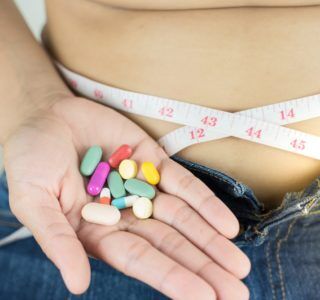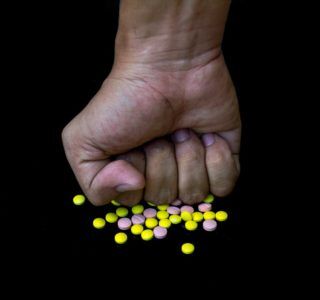Diet pills have been a godsend for many people struggling to control their appetite and lose weight. But unfortunately, diet pills can be addictive and potentially dangerous for people to use and abuse. Worse yet, any addictive substance rewires the risk and reward centers of the brain, making withdrawals intense and severe. But there are solutions for people who wish to beat their addiction to diet pills. A medically-supervised detox center can help people get the help and treatment they need to alleviate painful diet pill withdrawal symptoms and reach and maintain sobriety.
Understanding Diet Pill Withdrawal Symptoms and Solutions


Diet Pill Withdrawal
Understanding Diet Pill Withdrawal Symptoms and Solutions
Diet pills are available by prescription or over the counter. Most prescription diet pills are labeled a schedule III or IV drug and are a controlled substance closely related to prescription amphetamines. By scheduling the drugs as a controlled substance, doctors and law enforcement try to keep the drugs out of the hands of people who would abuse them and become addicted. But with so many in the U.S. struggling with weight loss, it’s all too common for people to get their hands on a diet pill illegally, or by taking more than the prescribed dose from their doctor. Diet pill abuse can cause dizziness, hallucinations, insomnia, chest pain, vomiting, and swelling in the lower extremities. Trying to quit will trigger distressing withdrawal symptoms. With help from trained doctors and professionals, diet pill addiction sufferers can alleviate these painful withdrawal symptoms and beat their addiction.
What is the timeline for diet pill withdrawal?
Diet pill withdrawal symptoms will start as soon as 6 hours after the last dose, depending on the individual. Most people will experience the first signs of physical withdrawal within 36 hours. Symptoms will peak within the first five to seven days after cessation, then gradually taper off. But, cravings for the drugs can linger for years after a person quits. Without the proper supports in place, people in recovery for diet pill addiction can relapse.
What are the physical symptoms of diet pill withdrawal?
- Fatigue
- Problems concentrating
- Muscle aches and pains
- Increased appetite
- Weight gain
- Lowered energy levels
What are the psychological or emotional symptoms that can occur during diet pill withdrawal?
The emotional symptoms of diet pill withdrawal can be intense and distressing, and may include the following:
- Irritability
- Low mood
- Anhedonia
- Depression
- Cravings
- Anxiety
Up to 24 million people in the U.S. suffer from eating disorders and negative body image. Many will go on to abuse diet pills in the hopes of losing weight and suppressing appetite. Often, when someone with these comorbid issues enters rehab for diet pill addiction, they may experience intense and unshakable anxiety and fear that they will gain weight. Fortunately, undergoing detox in a medically supervised environment can give patients the help they need for comorbid eating disorders. Therapists are available 24/7 to assist those with anxiety and body image issues recover from an eating disorder and diet pill addiction.
What’s the difference between a cold-turkey detox and detox at a medical center?
A cold-turkey detox means the person wishing to cure their addiction suddenly stops taking the drug or substance they’re addicted to. The body can and will go into a sort of shock when the substance it’s been using to function is taken away altogether. Withdrawal symptoms are intense and severe and can last a long time with cold turkey detox, putting the person at risk of relapse and severe health consequences.
In a medically-supervised detox center, patients are kept in a safe and structured environment. Replacement medications and tapering-off schedules are given to patients to alleviate the severity of withdrawal symptoms. Comorbid issues are also addressed in a detox and rehab center. By treating the patient’s underlying mental health condition, the chances of relapse are greatly diminished.
What is safe for diet pill detox?
When a patient enters a medical detox center, doctors will safely prescribe either a replacement drug for the patient, or an ever-decreasing dose of diet pills. Tapering off and replacement medications will prevent withdrawal symptoms from becoming severe or turning into a case of major depression.
What is not safe for diet pill detox?
It’s not safe for patients to suddenly quit taking the diet pills. Sudden cessation can trigger intense withdrawal symptoms, and also lead to a case of major depressive disorder. It’s also not safe for people going through a diet pill detox to be around harmful, negative influences. A medical detox center keeps patients safe from outside triggers and social factors which may influence them to relapse.
What happens during the withdrawal timeline?
When someone enters a medical detox center for diet pills, doctors first assess them for underlying mental and physical health problems. Doctors will also explore the patient’s addiction history. From there, doctors will put the patient on a tailor-made tapering off schedule so they can safely go through detox. Physical symptoms will peak within the first week after cessation, then gradually taper off. Doctors will also monitor the patient for emotional problems during the withdrawal timeline. In a medically-supervised detox center, therapists are available 24/7 to help patients through the emotional issues that will arise during withdrawal from diet pills.
How are diet pill withdrawals different from other amphetamine drugs?
Diet pill addiction differs from other amphetamine drug addictions in that the people who abuse diet pills usually have a comorbid eating disorder or body dysmorphic disorder. Support and ongoing maintenance plans will significantly differ for these patients. Doctors and therapists must address the underlying mental health condition to help prevent patients from relapsing.
What factors influence the withdrawal timeline on an individual level?
- How long and how much the person abused diet pills
- The person’s weight, age, and metabolic rate
- Underlying mental and physical health issues
- Polydrug abuse
Despite the different factors that can influence a person’s journey to sobriety from diet pills, doctors and therapists in a medical detox center are fully equipped to help any patient achieve a drug-free life. If you or someone you love is struggling with an addiction to diet pills, don’t hesitate to reach out and get help from a high-quality drug rehab center today.





